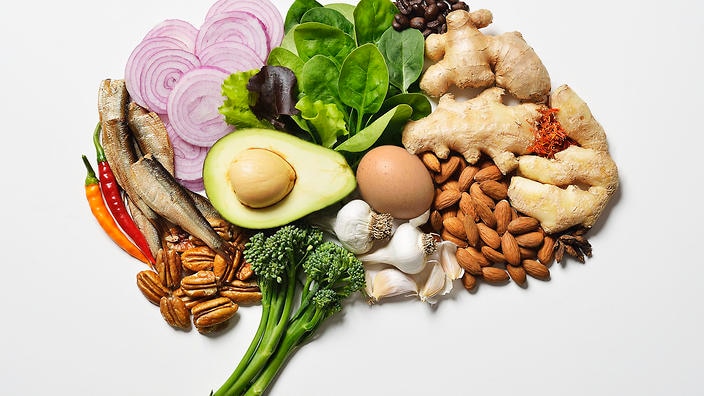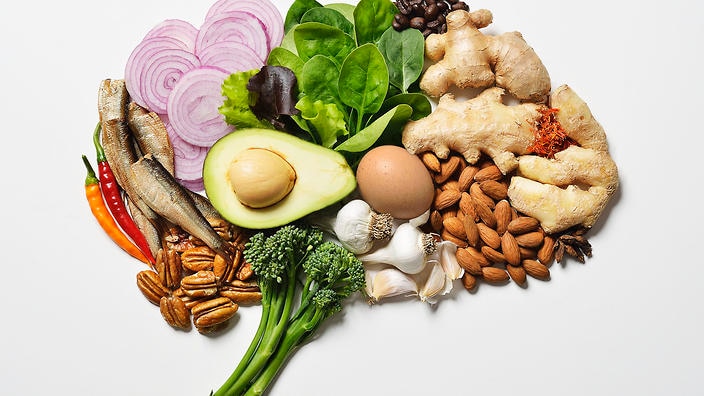Learn about brain health and nootropics to boost brain function
7 ways to eat to boost your brainpower, without taking supplements

In our recent pursuit to become smarter, faster, a new pharmaceutical market has been born for a type of supplement called ‘nootropics’.
Also known as ‘smart drugs’, nootropic supplements promise to enhance your cognition function and supercharge your memory. Take a nootropic pill regularly, marketing claims suggest, and you’ll be able to learn new things, feel more motivated, have better memory recall and boosted concentration rates.
Yet the sale of nootropic supplements raises one vital question: do we really need to be taking pills to boost our daily brain performance?
Melanie McGrice, spokesperson for the Dietitians Association of Australia, tells SBS that we don’t need to turn to pills for brainpower. We can boost our memory, concentration and mental performance by eating the right foods: nootropic foods.
“Of course, there are always exceptions to the rule: people who are unable to meet their nutritional requirements because they’ve had gastrointestinal surgery, have a food allergy or intolerance, a specific illness or are pregnant,” says McGrice, an Accredited Practising Dietitian.
“But, for the general population, I believe food should be our main source of our nutritional needs, for all situations including cognitive performance.”
Here are nootropic foods – ‘smart foods’ – that McGrice recommends we eat to maximise our brain’s performance.
1. Caffeine
You’ve probably already experienced how a cup of coffee or tea has boosted your mental alertness. But research also suggests that caffeine may be able to improve various memory types.
A study conducted by researchers at John Hopkins University shows that caffeine enhances certain memories for at least 24 hours after it is consumed.
The research, published by the journal Nature Neuroscience in 2014, concluded that caffeine can enhances our brain’s ability to consolidate long-term memories.
Another study also found caffeine may be able to improve the working memory (part of the short-term memory that deals with immediate conscious and linguistic processing) of older adults.
But let’s not forget that too much caffeine can cause anxiety in some people – your sensitivity levels are personal – and you can consume too much of a good thing.
2. Nuts
Research from Loma Linda University Health in the US shows that nuts can help with our brainwave function, learning, cognition and sleep.
The scientists found that some nuts like pistachios and peanuts (which are actually legumes but included in the study) stimulated some brain frequencies, required for learning, perception, information processing and function, more than others.
McGrice advises people to have one serve a day, equal to around 30 grams.
“Nuts won’t give you a quick fix or a sense of mental alertness in the way that, say, caffeine may, but it will boost your mental performance if you keep including them in your diet on a regular basis.”
3. Enjoy a low-GI diet and eat often
Sticking to a diet that includes small, regular low-GI meals could help to enhance your brain function, McGrice says. “I’ve seen it so often in clients that people who don’t eat small, regular meals struggle to think clearly. Carbohydrates are a primary fuel source for our brain. Low GI sources give our brain a constant source of energy.”
4. Eat leafy greens, avos and eggs
Leafy greens, including spinach and kale, avocados and eggs are a great source of lutein – a nutrient, which research suggests, can help to keep you cognitively fit.
A study, published in 2017, found that middle-aged participants with higher levels of lutein attained through diet had neural responses that were more on par with younger individuals than with their peers.
5. Berries
“We are supposed to have two serves of fruit a day. One punnet of strawberries is considered a serve. So I’d recommend having a punnet of berries three-to-four times a week, as part of your regular fruit intake.”
6. Water
7. Oily fish
McGrice explains that the long chain omega 3s in oily fish may improve learning and memory, and reduce inflammation in the brain.
McGrice advises that people eat two-to-three serves of oily fish, like salmon, a week.
Want to know a few home-truths about the vitamin supplements you're taking? Watch the new documentary, Vitamania on Sunday 12 August, 8.30pm on SBS. The documentary will be available after broadcast via SBS On Demand. Join the conversation @Vitamaniamovie #Vitamaniamovie.
Click here to view full article
7 ways to eat to boost your brainpower, without taking supplements

In our recent pursuit to become smarter, faster, a new pharmaceutical market has been born for a type of supplement called ‘nootropics’.
Also known as ‘smart drugs’, nootropic supplements promise to enhance your cognition function and supercharge your memory. Take a nootropic pill regularly, marketing claims suggest, and you’ll be able to learn new things, feel more motivated, have better memory recall and boosted concentration rates.
Yet the sale of nootropic supplements raises one vital question: do we really need to be taking pills to boost our daily brain performance?
Melanie McGrice, spokesperson for the Dietitians Association of Australia, tells SBS that we don’t need to turn to pills for brainpower. We can boost our memory, concentration and mental performance by eating the right foods: nootropic foods.
“Of course, there are always exceptions to the rule: people who are unable to meet their nutritional requirements because they’ve had gastrointestinal surgery, have a food allergy or intolerance, a specific illness or are pregnant,” says McGrice, an Accredited Practising Dietitian.
“But, for the general population, I believe food should be our main source of our nutritional needs, for all situations including cognitive performance.”
Here are nootropic foods – ‘smart foods’ – that McGrice recommends we eat to maximise our brain’s performance.
1. Caffeine
You’ve probably already experienced how a cup of coffee or tea has boosted your mental alertness. But research also suggests that caffeine may be able to improve various memory types.
A study conducted by researchers at John Hopkins University shows that caffeine enhances certain memories for at least 24 hours after it is consumed.
The research, published by the journal Nature Neuroscience in 2014, concluded that caffeine can enhances our brain’s ability to consolidate long-term memories.
Another study also found caffeine may be able to improve the working memory (part of the short-term memory that deals with immediate conscious and linguistic processing) of older adults.
But let’s not forget that too much caffeine can cause anxiety in some people – your sensitivity levels are personal – and you can consume too much of a good thing.
2. Nuts
Research from Loma Linda University Health in the US shows that nuts can help with our brainwave function, learning, cognition and sleep.
The scientists found that some nuts like pistachios and peanuts (which are actually legumes but included in the study) stimulated some brain frequencies, required for learning, perception, information processing and function, more than others.
McGrice advises people to have one serve a day, equal to around 30 grams.
“Nuts won’t give you a quick fix or a sense of mental alertness in the way that, say, caffeine may, but it will boost your mental performance if you keep including them in your diet on a regular basis.”
3. Enjoy a low-GI diet and eat often
Sticking to a diet that includes small, regular low-GI meals could help to enhance your brain function, McGrice says. “I’ve seen it so often in clients that people who don’t eat small, regular meals struggle to think clearly. Carbohydrates are a primary fuel source for our brain. Low GI sources give our brain a constant source of energy.”
4. Eat leafy greens, avos and eggs
Leafy greens, including spinach and kale, avocados and eggs are a great source of lutein – a nutrient, which research suggests, can help to keep you cognitively fit.
A study, published in 2017, found that middle-aged participants with higher levels of lutein attained through diet had neural responses that were more on par with younger individuals than with their peers.
5. Berries
“We are supposed to have two serves of fruit a day. One punnet of strawberries is considered a serve. So I’d recommend having a punnet of berries three-to-four times a week, as part of your regular fruit intake.”
6. Water
7. Oily fish
McGrice explains that the long chain omega 3s in oily fish may improve learning and memory, and reduce inflammation in the brain.
McGrice advises that people eat two-to-three serves of oily fish, like salmon, a week.
Want to know a few home-truths about the vitamin supplements you're taking? Watch the new documentary, Vitamania on Sunday 12 August, 8.30pm on SBS. The documentary will be available after broadcast via SBS On Demand. Join the conversation @Vitamaniamovie #Vitamaniamovie.
Click here to view full article
Leave a Reply
You must be logged in to post a comment.